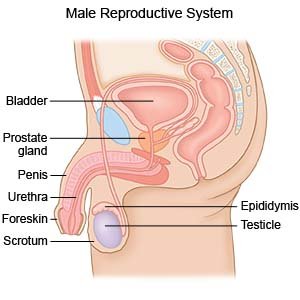Testicular Cancer
Medically reviewed by Drugs.com. Last updated on Oct 29, 2024.
Most testicular cancer starts in the sperm-making cells of the testicles. Testicular cancer occurs most commonly in males aged 15 to 39 years.
 |
WHILE YOU ARE HERE:
Informed consent
is a legal document that explains the tests, treatments, or procedures that you may need. Informed consent means you understand what will be done and can make decisions about what you want. You give your permission when you sign the consent form. You can have someone sign this form for you if you are not able to sign it. You have the right to understand your medical care in words you know. Before you sign the consent form, understand the risks and benefits of what will be done. Make sure all your questions are answered.
An IV
is a small tube placed in your vein that is used to give you medicine or liquids.
You may need extra oxygen
if your blood oxygen level is lower than it should be. You may get oxygen through a mask placed over your nose and mouth or through small tubes placed in your nostrils. Ask your healthcare provider before you take off the mask or oxygen tubing.
Medicines:
- Antinausea medicine may be given to calm your stomach and prevent vomiting.
- Pain medicine may be given. Do not wait until the pain is severe before you ask for more medicine.
Tests:
You may need more than one of the following tests to help your healthcare providers plan your treatment:
- Blood tests may be done to check for cancer markers.
- An x-ray, ultrasound, or CT may show if the cancer has spread. You may be given contrast liquid to help healthcare providers see the cancer better. Tell the healthcare provider if you have ever had an allergic reaction to contrast liquid.
- A biopsy may be used to take tissue from the testicle to be tested for the type of testicular cancer.
- Lymphangiography is a procedure that uses dye to see if the cancer has spread to your lymph nodes.
- A bone scan may show if cancer has spread to your bones. You may need a bone scan if you have bone pain.
Treatment:
Your treatment may change if the cancer is not being controlled. You may have some of the following treatments alone or together:
- Surgery may be used to remove the testicle. Tissue from the testicle is tested to learn what type of cancer cells were growing in your testicle. If you have lymph nodes that have cancer in them, they may also be removed.
- Radiation therapy uses x-rays or gamma rays to treat cancer. Radiation kills cancer cells and may stop the cancer from spreading.
- Chemotherapy medicine is used to treat cancer by killing cancer cells. Chemotherapy may also be used to shrink lymph nodes that have cancer in them.
Treatment options
The following list of medications are related to or used in the treatment of this condition.
RISKS:
Cancer may spread or come back. Some types of treatment can cause you to be infertile (unable to father a child). You may get a blood clot in your arm or leg. This may become life-threatening.
CARE AGREEMENT:
You have the right to help plan your care. Learn about your health condition and how it may be treated. Discuss treatment options with your healthcare providers to decide what care you want to receive. You always have the right to refuse treatment.© Copyright Merative 2024 Information is for End User's use only and may not be sold, redistributed or otherwise used for commercial purposes.
The above information is an educational aid only. It is not intended as medical advice for individual conditions or treatments. Talk to your doctor, nurse or pharmacist before following any medical regimen to see if it is safe and effective for you.
Learn more about Testicular Cancer
Treatment options
Care guides
Symptoms and treatments
Further information
Always consult your healthcare provider to ensure the information displayed on this page applies to your personal circumstances.
